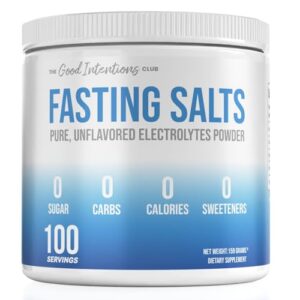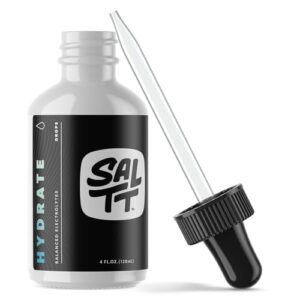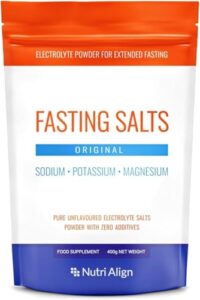This site is supported by our readers. We may earn a commission, at no cost to you, if you purchase through links.

You’ll face dangerous electrolyte imbalances, severe nutrient deficiencies, and metabolic slowdown that makes weight loss harder over time.
Extended fasting periods can trigger eating disorders, disrupt hormones, and cause dehydration that strains your heart and kidneys.
The diet’s "snake juice" recipe lacks scientific backing and may spike blood pressure dangerously.
Pregnant women, diabetics, and anyone with health conditions face even greater risks.
While quick results seem tempting, your body needs consistent nutrition to function properly.
There are seven specific dangers that could seriously impact your health.
The diet’s approach is linked to severe consequences, including metabolic slowdown and nutrient deficiencies.
Table Of Contents
- Key Takeaways
- Snake Diet Health Risks
- Top 10 Fasting Supplements
- 1. Good Intentions Fasting Electrolyte Powder
- 2. Fast Lyte Electrolyte Supplement Powder
- 3. SlimFast Berry Lemonade Energy Electrolytes
- 4. Keto Electrolyte Hydration Drops Unflavored
- 5. Prolon 5 Day Fasting Kit
- 6. Enzymedica Fasting Today Drink Mix
- 7. ProLon 3 Day Fasting Reset Kit
- 8. Nutri Align Fasting Electrolytes Powder
- 9. Real Ketones Fasting Drink Watermelon
- 10. Keto Berberine Complex Metabolism Gummies
- Fasting Risks and Complications
- Snake Juice Concerns
- Risks for Specific Groups
- Eating Disorder Concerns
- Safer Alternatives and Healthier Choices
- Frequently Asked Questions (FAQs)
- What are the side effects of snake juice?
- How often do you eat on the snake diet?
- What is the snake diet protocol?
- How many calories should I have on the snake diet?
- What are the dangers of the Snake Diet?
- How does Snake Juice affect my body?
- How does fasting impact people with diabetes?
- Can the Snake Diet cause eating disorders?
- What are healthier alternatives to the Snake Diet?
- Is the Snake Diet safe during pregnancy?
- Conclusion
Key Takeaways
- You’ll face dangerous nutrient deficiencies from eating only one meal every few days, leading to vitamin shortages, mineral imbalances, and protein depletion that compromise your immune system and overall health.
- Your metabolism will slow down significantly as your body enters survival mode, reducing daily calorie burn by 20-30% and making long-term weight loss harder through muscle loss and hormonal disruption.
- You’re risking serious electrolyte imbalances from Snake Juice’s high sodium content and dehydration during extended fasts, which can cause heart palpitations, dizziness, and dangerous blood pressure spikes.
- You could develop eating disorders from the extreme restrictions and all-or-nothing mentality, creating an unhealthy relationship with food that leads to guilt, social isolation, and potential binge-restrict cycles.
Snake Diet Health Risks
You’re likely drawn to the Snake Diet’s promises of rapid weight loss, but this extreme fasting approach carries serious health risks that can harm your body.
The combination of prolonged fasting periods and severe calorie restriction creates dangerous conditions that go far beyond typical diet side effects.
Nutrient Deficiencies and Malnutrition
The Snake Diet’s extreme calorie restriction creates a perfect storm for nutritional deficiencies.
You’ll struggle to meet your body’s micronutrient needs when eating only one meal every few days.
This severe nutrient intake limitation leads to vitamin deficiencies, mineral imbalance, and protein depletion.
Your gut health suffers as beneficial bacteria starve alongside you, compromising nutrient absorption even further.
The diet’s creator, Cole Robinson, advocates consuming Snake Juice to combat these nutritional deficiencies.
Electrolyte Imbalances and Dehydration
Extended fasting periods drastically increase your dehydration risk and electrolyte imbalances.
Snake Juice’s high sodium content can worsen potassium levels and magnesium depletion.
Water restriction during fasting puts dangerous kidney strain on your body.
You’ll likely experience dizziness, heart palpitations, and confusion from these dangerous imbalances that threaten your health.
Low humidity can further exacerbate signs of dehydration, leading to severe health issues and electrolyte problems.
Slower Metabolism and Weight Loss Plateaus
Beyond dehydration, your body’s metabolic adaptation becomes another serious concern.
Prolonged calorie restriction triggers your basal metabolic rate to plummet as your system enters survival mode.
- Metabolic slowdown reduces daily calorie burn by 20-30% per kilogram lost
- Muscle loss directly lowers metabolic rates since muscle burns more calories at rest
- Hormonal imbalance drives appetite increases of 100 calories daily per kilogram lost
This creates frustrating weight loss plateaus that can persist for months, making long-term effects counterproductive.
Disordered Eating Patterns and Mental Health
Prolonged calorie restriction doesn’t just slow your metabolism—it can trigger disordered eating patterns that harm your mental wellbeing.
You might develop an unhealthy relationship with food, experiencing intense food guilt and body image issues.
The extreme restriction often leads to social isolation as you avoid meals with others.
| Mental Health Impact | Eating Behavior Changes | Social Consequences |
|---|---|---|
| Increased anxiety around food | Obsessive meal planning | Avoiding social gatherings |
| Depression from restriction | Binge-restrict cycles | Isolation from family meals |
| Body image distortion | Fear of "forbidden" foods | Loss of food enjoyment |
| Low self-esteem | All-or-nothing thinking | Relationship strain |
Top 10 Fasting Supplements
If you’re considering fasting supplements while following the Snake Diet, you’ll want to choose products that support your body during extended fasting periods without compromising your health.
The supplements listed below can help maintain electrolyte balance and provide essential nutrients, but they shouldn’t be viewed as a solution to the fundamental risks associated with extreme fasting protocols.
1. Good Intentions Fasting Electrolyte Powder

Good Intentions Fasting Electrolyte Powder offers a clean, science-backed approach to maintaining hydration during fasting periods.
You’ll get essential minerals—sodium, potassium, magnesium, and calcium—without breaking your fast since it contains zero calories, sugars, or artificial additives.
Each serving provides 500mg sodium chloride and balanced electrolytes to prevent common fasting side effects like fatigue, headaches, and muscle cramps.
The unflavored formula mixes easily into water, making it simple to stay hydrated, and with 100 servings per container, it’s cost-effective for extended fasting protocols while supporting your energy levels naturally.
Best For: Those practicing intermittent or extended fasting, keto, or low-carb diets who want clean hydration without breaking their fast.
- No sugars, flavors, or sweeteners—won’t trigger insulin or break a fast.
- Delivers all four key electrolytes for balanced hydration and muscle support.
- Mixes easily, unflavored, and provides a full month’s supply in each container.
- Not suitable for people with sodium restrictions or certain medical conditions.
- Lacks flavor, which may be unappealing to some users.
- Only available in unflavored formula, offering no taste variety.
2. Fast Lyte Electrolyte Supplement Powder

Fast Lyte delivers electrolytes without the extreme restrictions of snake juice protocols.
This powder contains balanced sodium, potassium, and magnesium levels that won’t overwhelm your system during fasting periods.
You’ll find it mixes easily in water and tastes better than homemade electrolyte drinks.
The formula supports hydration without triggering digestive issues that plague some fasters.
Unlike snake diet extremes, Fast Lyte allows flexible dosing based on your body’s actual needs rather than rigid fasting rules.
This approach enables a more personalized and balanced fasting experience.
Best For: People following fasting, keto, vegan, paleo, or carnivore diets who need clean, flexible electrolyte support without artificial additives.
- Contains high levels of potassium, sodium, magnesium, and trace minerals for complete electrolyte replenishment.
- No fillers, sweeteners, artificial flavors, or colors—just pure, raw minerals.
- Supports hydration, muscle function, and reduces fasting-related cramps and fatigue.
- High potassium content can cause issues if overdosed, especially in people with kidney problems.
- Unflavored and salty taste may be unpleasant or difficult to mask for some users.
- Not recommended for pregnant, breastfeeding individuals, or those with certain health conditions.
3. SlimFast Berry Lemonade Energy Electrolytes

SlimFast Berry Lemonade Energy Electrolytes delivers 100mg of caffeine and essential electrolytes in convenient stick packs.
You’ll get energy support during fasting without breaking your fast, thanks to zero added sugar and only 5 calories per serving.
The berry lemonade flavor makes hydration more enjoyable, though some users report an artificial aftertaste.
While it won’t replace proper nutrition, it can help maintain fluid balance and energy levels during intermittent fasting periods when used appropriately, providing a useful tool for those seeking to support their energy levels.
Best For: Adults practicing intermittent fasting who need convenient hydration and a mild energy boost without added sugar.
- Supports hydration and energy during fasting without breaking the fast
- Convenient, portable stick packs for on-the-go use
- Zero added sugar and only 5 calories per serving
- Contains artificial sweeteners and coloring, which may cause digestive symptoms or taste concerns
- Caffeine content may not be suitable for sensitive individuals or late-day use
- Not a meal replacement and lacks significant nutrition
4. Keto Electrolyte Hydration Drops Unflavored

Why settle for complicated electrolyte powders when you can get targeted hydration support? Keto Electrolyte Hydration Drops offer unflavored convenience that mixes seamlessly into any beverage.
You’ll get 390mg sodium, 130mg potassium, and 45mg magnesium from Great Salt Lake minerals. The doctor-approved formula supports ketosis goals without artificial ingredients.
The Snake Diet promotes prolonged fasting periods to achieve a calorie deficit. While some users find the taste salty, it’s effective for preventing keto flu symptoms during fasting periods.
Best For: People on keto, low-carb, or fasting diets who need easy, on-the-go hydration and electrolyte support.
- Clean, doctor-approved formula with sodium, potassium, and magnesium sourced from natural minerals.
- Unflavored, portable drops that mix with any beverage and fit most dietary restrictions.
- Effectively reduces keto flu symptoms and supports energy during fasting.
- Salty taste may be unappealing for some users.
- Higher sodium content might not suit those on low-salt diets.
- Measuring and dosing can vary by bottle size, requiring attention to serving instructions.
5. Prolon 5 Day Fasting Kit

ProLon’s 5-day fasting kit offers a structured approach to fasting with plant-based meals, supplements, and snacks.
You’ll consume 700-1100 calories daily while maintaining a fasting state.
The kit includes soups, nut bars, olives, and herbal teas designed to support cellular rejuvenation.
While research shows promising results for weight loss and longevity, some users report hunger, fatigue, and digestive issues.
The high price point may limit regular use for most people.
Best For: Motivated adults seeking a scientifically backed fasting experience to support weight loss, metabolic reset, and cellular rejuvenation.
- Price is high, making frequent use expensive for many.
- Some users experience hunger, fatigue, or digestive discomfort.
- Repetitive meals and snacks may lead to taste fatigue.
- Convenient, pre-portioned, plant-based meals and supplements for five days.
- Clinically supported benefits for weight loss, metabolic health, and longevity.
- Helps maintain a fasting state while providing essential nutrients.
6. Enzymedica Fasting Today Drink Mix

Enzymedica’s Fasting Today offers a thorough approach to intermittent fasting support.
You’ll get electrolytes, baobab fiber, and nine essential amino acids in one tropical pineapple-flavored drink.
At 19 calories per scoop, it won’t break your fast while helping manage hunger and maintaining muscle.
The organic formula contains 430mg of electrolytes and 4g of amino acids.
Mix one scoop with water during fasting windows.
Users report reduced cravings and better digestion, though some find the taste challenging and question the $30 price point.
Best For: Those practicing intermittent fasting who want a low-calorie, all-in-one drink mix to ease hunger and maintain muscle without breaking their fast.
- Supports hydration, muscle maintenance, and satiety during fasting windows
- Organic, allergen-free formula suitable for keto, vegan, and sensitive diets
- Reported benefits include reduced cravings, better digestion, and appetite control
- Some users dislike the taste and texture, especially after mixing
- Premium price point (~$30) may not suit all budgets
- Not recommended for those with certain medical conditions or sensitivities without consulting a doctor
7. ProLon 3 Day Fasting Reset Kit

Switching from extreme diets to structured fasting programs offers a gentler approach to metabolic reset.
ProLon’s 3-Day Fasting Reset Kit provides plant-based soups, nut bars, and supplements designed to mimic fasting while delivering approximately 800 calories daily.
You’ll maintain essential nutrition during the process, unlike harsh restriction methods, and clinical research shows it triggers autophagy and cellular renewal within three to five days.
The pre-portioned meals eliminate guesswork, though some users report mixed reactions to soup flavors and textures, which can be a consideration for those starting a fasting program.
Best For: People seeking a structured, science-backed fasting program for metabolic health, weight management, or a cellular reset.
- Mixed reviews on taste and texture, especially with soups and supplements.
- Higher cost compared to traditional fasting or meal prepping.
- Not suitable for pregnant women, diabetics, or those with certain health conditions.
- Backed by clinical research, supporting autophagy and cellular rejuvenation.
- Convenient, pre-packaged meals with clear instructions and essential nutrition.
- Shown to reduce inflammation, support weight loss, and improve insulin sensitivity.
8. Nutri Align Fasting Electrolytes Powder

Nutri Align offers a straightforward approach to fasting electrolytes without the bells and whistles.
You’ll find essential minerals like sodium, potassium, and magnesium in balanced ratios that support your body during extended fasts.
The unflavored powder dissolves easily in water, though you might need to experiment with dilution to find your sweet spot.
While it’s generally well-tolerated, start with smaller doses to gauge your body’s response.
The clean ingredient list appeals to purists who want electrolyte support without artificial additives or questionable fillers during their fasting journey.
With essential minerals and a simple formulation, Nutri Align is a good choice for those seeking a minimalistic approach to electrolyte replenishment.
Best For: People who want pure, filler-free electrolytes for fasting, keto, or intermittent fasting without added flavors, sugars, or extra ingredients.
- Simple, clean formula with just sodium, potassium, and magnesium—no fillers or sweeteners.
- Supports effective fasting by helping prevent cramps, headaches, and energy dips.
- Flexible for different fasting styles and easy to adjust dosage based on needs.
- Salty, ocean-like taste may be hard to tolerate for some users.
- High sodium content not ideal for everyone; can cause stomach upset if overused.
- Pricier than some alternatives despite the no-frills formula.
9. Real Ketones Fasting Drink Watermelon

Real Ketones Fasting Drink Watermelon offers a sugar-free blend of BHB ketones and electrolytes that’s designed to support your fasting journey.
You’ll get appetite control benefits from clinically-tested ingredients that help regulate hunger hormones.
The watermelon flavor provides energy without breaking your fast, though some users report clumping issues and intense sweetness.
While it’s marketed for men, the ingredients work for anyone following intermittent fasting or keto protocols.
Consider consulting your healthcare provider before adding any supplement to your routine.
Best For: Active adults practicing intermittent fasting or a ketogenic diet who want easy appetite control, hydration, and a quick boost of energy.
- Mixed taste and texture reviews, with some issues of clumping or intense sweetness
- Contains caffeine, which may cause jitters or disrupt sleep
- Higher price point and not intended as a meal substitute
- Supports ketosis and curbs hunger without sugar or carbs
- Clean energy from BHB and green coffee bean extract
- Helps maintain hydration and electrolytes during fasting
10. Keto Berberine Complex Metabolism Gummies

These gummies offer a convenient way to support your fasting goals, combining berberine with metabolism-boosting ingredients.
They activate AMPK enzymes, which help regulate cellular energy and may improve insulin sensitivity during fasting periods.
The watermelon flavor makes them more palatable than traditional capsules, though you’ll want to check if they contain sugars that could break your fast.
While clinical studies show berberine can reduce blood glucose by 20%, the gummy form may have lower bioavailability than capsules.
Best For: People seeking a sugar-free, easy-to-take supplement to support metabolism, fasting efforts, and metabolic health without the stomach discomfort of capsules.
- No sugar, vegan, and gentle on the stomach for easy daily use.
- Supports metabolic health, fasting, and liver function with a pleasant taste.
- Convenient gummy form preferred over pills or powders for travel and daily routines.
- Lower absorption than capsules reduces potency and weight loss impact.
- Mixed reviews about changes in texture and taste in newer batches.
- May interact with some medications and is not recommended during pregnancy.
Fasting Risks and Complications
When you push your body through extreme fasting cycles like those in the Snake Diet, you’re basically forcing it into survival mode where serious complications can develop quickly.
These risks go far beyond simple hunger pangs and can create lasting health problems that affect your metabolism, mental state, and overall well-being.
Prolonged Fasting and Starvation Mode
Your body fights back when you drastically cut calories through prolonged fasting.
Your body shifts into survival mode, slashing metabolism by up to 40% when calories drop too low.
Adaptive thermogenesis kicks in, slowing your metabolic rate by up to 40%.
This metabolic slowdown makes weight loss harder and can cause muscle loss, fatigue, and cold sensitivity.
Snake diet risks include hormonal disruptions that impact nutrient absorption, creating a cycle where your body hoards energy instead of burning it efficiently.
Insufficient Nutrient Intake and Deficiencies
Several major nutrient gaps emerge when you’re following the Snake Diet’s extreme restrictions.
Your body desperately needs consistent Vitamin Deficiencies in B-complex and vitamin D, plus Mineral Shortages in iron and calcium.
Protein Scarcity becomes critical for muscle maintenance, while Fiber Deprivation disrupts digestion.
Essential Fats disappear completely, leaving your brain and hormones struggling.
These micronutrients deficiencies lead to malnourishment despite initial weight loss.
Dehydration and Electrolyte Imbalance
Prolonged fasting through the Snake Diet creates serious dehydration risk despite Snake Juice consumption.
Your body loses essential electrolytes, leading to dangerous electrolyte imbalances, including Sodium Deficiency and Magnesium Loss when Fluid Restriction combines with extreme fasting.
Potassium Levels drop substantially, putting tremendous Kidney Strain on your system, which can cause heart problems and organ dysfunction.
Negative Impact on Hormonal Balance and Metabolism
When you drastically cut calories, your hormones go haywire.
Thyroid Impact occurs as T3 and T4 production drops, triggering Metabolic Slowdown.
Leptin and ghrelin levels shift, disrupting hunger signals and causing Hormone Disruption.
This creates Insulin Resistance and potential Fertility Issues, while nutrient deficiencies worsen metabolic acidosis and electrolyte imbalance throughout your system.
Snake Juice Concerns
Snake Juice, the electrolyte drink promoted with the Snake Diet, contains dangerously high levels of sodium that can spike your blood pressure and create serious health complications.
The unbalanced formula lacks scientific backing and may interfere with medications or worsen existing health conditions, posing a significant risk due to its potential to cause serious health complications.
High Sodium Intake and Blood Pressure
Snake Juice packs a sodium punch that can send your blood pressure soaring.
Each packet contains over 1,000 mg of sodium – nearly half your daily limit.
When you’re consuming multiple packets during fasting, you’re basically playing Russian roulette with your cardiovascular system.
- Your kidneys working overtime to filter excess sodium
- Blood vessels constricting like garden hoses under pressure
- Heart pumping harder against increased fluid retention
- Arteries stiffening from chronic sodium overload
- Silent hypertension creeping up without warning signs
The snake diet dangers extend beyond simple high blood pressure.
Excessive sodium intake disrupts your body’s natural balance, forcing your heart to work harder while your kidneys struggle to maintain proper fluid levels.
This creates a perfect storm for heart disease and kidney health complications that contradict basic dietary guidelines.
You can find products related to sodium blood pressure online.
Unbalanced Electrolyte Levels and Health Risks
When you drink Snake Juice regularly, you’re playing with fire regarding electrolyte balance.
The homemade mixture can cause Sodium Imbalance and Potassium Deficiency, leading to Muscle Cramps and dangerous Heart Arrhythmia.
These electrolyte imbalances strain your Kidney Function and may trigger heart problems or kidney failure.
Dehydration compounds these risks, creating a perfect storm for serious health complications, particularly Heart Arrhythmia.
Lack of Scientific Evidence and Unproven Benefits
The Snake Diet stands on shaky ground—Cole Robinson’s baseless claims lack scientific backing.
His misleading marketing promotes unsubstantiated detox benefits without peer-reviewed research.
Key concerns about anecdotal claims:
- Limited Research – No controlled studies validate long-term effects
- Unverified Culinary Experience – Success stories rely on testimonials, not data
- Medical Rejection – Healthcare professionals dismiss the diet’s foundational principles
Potential Interactions With Medications and Health Conditions
Beyond lacking scientific support, Snake Juice creates dangerous medication interference with blood pressure drugs, diabetes medications, and heart treatments.
If you have preexisting medical conditions like kidney disease, the high sodium content worsens existing conditions while fasting complications multiply health risks.
Electrolyte disturbance from this regimen can trigger serious kidney health problems, making the Snake Diet particularly hazardous for anyone taking medications, due to potential medication interference.
Risks for Specific Groups
The Snake Diet poses serious health risks for certain groups who shouldn’t attempt this extreme fasting approach.
Pregnant women, children, elderly individuals, and people with medical conditions face dangerous complications that could threaten their health and safety, making it an approach that requires careful consideration of one’s health.
Pregnant Women and Breastfeeding Mothers
Pregnancy and breastfeeding create heightened nutrient needs that the Snake Diet can’t meet.
Extreme dieting risks during these periods include nutrient deficiencies affecting fetal development and lactation impact on infant health.
Medical supervision becomes non-negotiable when health complications arise from restrictive eating patterns.
Safe alternatives focusing on balanced nutrition protect both mother and baby from disordered eating consequences.
Snakes, however, require a diet that meets their high protein needs to support their high protein requirements.
Individuals With Underlying Health Conditions
If you’re managing diabetes, heart conditions, kidney disease, or other medical conditions, the Snake Diet poses serious health risks.
Extreme dieting risks include dangerous medication interactions and severe side effects that can worsen your condition.
Medical supervision is essential before any restrictive diet. Immune compromise increases vulnerability to malnutrition.
Elderly and Vulnerable Populations
Elderly adults face heightened snake diet health risks due to age-related vulnerabilities.
Frailty risks increase when severe calorie restriction weakens already declining muscle mass.
Medication interactions become dangerous as electrolyte imbalances interfere with prescriptions for heart conditions or diabetes.
Cognitive decline may worsen from nutrient deficiencies, while social isolation intensifies when strict eating windows disrupt family meals and community connections, leading to increased social isolation and cognitive decline.
Adolescents and Children
Children and teens face serious dangers from the Snake Diet’s restrictive approach.
Their growing bodies need consistent nutrition for proper growth stunting prevention and cognitive development.
Extreme dieting can severely impact bone density formation during these critical years.
The restrictive diet often triggers eating disorders, with parental influence playing a key role in normalized unhealthy relationships with food, leading to lasting health complications, particularly in the context of proper growth.
Eating Disorder Concerns
The Snake Diet’s extreme restrictions can trigger serious eating disorders or worsen existing ones.
You’ll likely develop an unhealthy relationship with food that focuses on guilt, shame, and dangerous all-or-nothing thinking patterns.
Triggering or Exacerbating Eating Disorders
Extreme fasting triggers disordered eating patterns by creating an unhealthy relationship with food through severe restriction.
The Snake Diet’s rigid rules and "all-or-nothing" mentality can worsen existing eating disorders or spark new ones.
Diet culture influence reinforces body image issues, while prolonged food restriction dangers include mental health impact and long-term consequences affecting your relationship with eating.
This can even lead to ARFID eating disorder, resulting in severe and potentially lasting mental health impact.
Negative Impact on Self-Esteem and Confidence
The Snake Diet’s extreme restrictions can crush your self-worth and confidence.
When you’re constantly hungry and deprived, your mental health suffers.
This psychological impact creates a vicious cycle where food guilt leads to self-worth decline, making you feel like a failure when you can’t maintain such harsh restrictions.
- You start believing your worth depends on how little you eat
- Social isolation grows as you avoid meals with friends and family
- Body image issues worsen when the diet inevitably fails to deliver promised results
Unrealistic Expectations and Body Shaming
Diet culture pressures you to chase unrealistic ideals that social media constantly reinforces.
The Snake Diet’s creator uses stigmatizing language that damages self-perception and mental wellbeing.
This approach can trigger disordered eating patterns, creating an unhealthy relationship with food.
When extreme methods fail, you might blame yourself rather than questioning the diet’s impossible standards, deepening an eating disorder cycle.
Safer Alternatives and Healthier Choices
Instead of risking your health with extreme fasting, you can choose safer approaches that actually work long-term.
Evidence-based methods like balanced nutrition, regular exercise, and gradual weight loss help you reach your goals without the dangerous side effects of restrictive diets.
They provide a long-term solution to health and weight management, focusing on sustainable lifestyle changes rather than quick fixes.
Balanced and Sustainable Diets
Instead of following extreme fasting protocols, you can achieve lasting results through balanced nutrition that supports your body’s needs.
A well-rounded diet emphasizes dietary variety and portion control while promoting mindful eating habits that encourage long-term adherence.
The diet’s creator promotes rapid weight loss, but it poses health risks.
Consider these sustainable lifestyle changes for holistic wellness:
- Eat colorful whole foods – Fill half your plate with vegetables and fruits
- Practice portion control – Use smaller plates and listen to hunger cues
- Choose balanced meals – Include protein, healthy fats, and complex carbohydrates
- Stay consistent – Focus on healthy eating patterns you can maintain long-term
Healthy and Sustainable Weight Loss Strategies
You don’t have to starve yourself to lose weight effectively.
Sustainable weight loss happens when you create a modest calorie deficit through balanced nutrition and regular exercise. Start with portion control and mindful eating—listen to your hunger cues instead of restricting everything.
| Sustainable Strategy | Safe Approach |
|---|---|
| Balanced Nutrition | Include all food groups daily |
| Regular Exercise | 150 minutes moderate activity weekly |
| Portion Control | Use smaller plates, measure servings |
| Mindful Eating | Eat slowly without distractions |
| Gradual Changes | Lose 1-2 pounds per week maximum |
Evidence-based approaches show that sustainable lifestyle changes work better than extreme restrictions. Your body responds well to consistent, healthy eating patterns rather than dramatic swings between fasting and feasting.
To achieve this, consider incorporating structured meal plans into your diet.
Professional Guidance and Support
Most qualified healthcare professionals recommend consulting registered dietitians for personalized plans rather than extreme dieting.
Medical supervision guarantees evidence-based advice adapted to your unique needs.
Working with a physician provides safety checks that self-guided restrictive eating can’t offer, and professional advice helps create sustainable habits without dangerous shortcuts.
Focus on Overall Health and Well-being
True health means more than just a number on the scale.
Your well-being thrives when you prioritize these five areas:
- Mental Wellness – managing stress and emotions
- Balanced Nutrition – eating varied, whole foods
- Physical Activity – moving your body regularly
- Quality Sleep – getting 7-9 hours nightly
- Social Connections – maintaining supportive relationships
This Holistic Health approach prevents health risks while building Sustainable Habits that last.
Frequently Asked Questions (FAQs)
What are the side effects of snake juice?
Snake juice’s electrolyte blend can backfire, triggering dangerous imbalances despite its mineral content.
You’ll risk dehydration, fatigue, nausea, and potential kidney strain from excessive sodium and potassium intake during prolonged fasting periods.
How often do you eat on the snake diet?
You’ll eat just once during a narrow 1-2 hour window after prolonged fasts of 48-96 hours. This extreme restriction creates serious health risks including nutrient deficiencies and metabolic problems.
What is the snake diet protocol?
You’ll follow three phases: start with a 48-hour fast drinking only "Snake Juice" electrolytes, then cycle between multi-day fasts and single meals, finally maintaining with shorter fasts and one-meal days.
How many calories should I have on the snake diet?
The Snake Diet recommends dangerously low calorie intake – around 3,500 calories weekly versus the standard 14,
This extreme restriction can cause metabolic damage, nutrient deficiencies, and eating disorders.
Sustainable weight loss requires adequate nutrition.
What are the dangers of the Snake Diet?
You’re risking serious nutritional deficiencies, metabolic damage, eating disorders, and dangerous electrolyte imbalances. The extreme fasting approach lacks scientific backing and can trigger harmful relationships with food.
How does Snake Juice affect my body?
Consider a fitness enthusiast who started Snake Juice hoping to boost their fasting results.
Snake Juice can cause electrolyte imbalances, dehydration, and digestive issues despite its mineral content, potentially leading to fatigue, dizziness, and metabolic disruption in your body.
How does fasting impact people with diabetes?
Fasting affects people with diabetes differently based on your type and medication.
Insulin sensitivity increases, and insulin levels decrease during fasting, potentially improving blood sugar control.
However, you’ll risk dangerous hypoglycemia if you’re on insulin or certain medications.
Can the Snake Diet cause eating disorders?
Don’t bite off more than you can chew—the Snake Diet’s extreme restrictions and harmful language can absolutely trigger eating disorders. You’ll risk developing unhealthy food relationships through prolonged fasting.
What are healthier alternatives to the Snake Diet?
Choose balanced approaches like intermittent fasting with healthy meals, Mediterranean diet, or sustainable calorie reduction. You’ll find better results combining nutritious whole foods with regular exercise for lasting weight loss.
Is the Snake Diet safe during pregnancy?
No, the Snake Diet isn’t safe during pregnancy.
You’ll face serious risks including nutrient deficiencies, dehydration, and potential harm to your developing baby.
Pregnancy requires consistent nutrition, not extreme fasting that could jeopardize both your health and your child’s development.
Conclusion
Like medieval physicians prescribing leeches for every ailment, the Snake Diet promises miraculous results through dangerous extremes.
The snake diet health risks we’ve explored aren’t worth any temporary weight loss you might see.
Severe nutrient deficiencies, dangerous electrolyte imbalances, and metabolic damage can harm your body for years.
Instead of risking your health with extreme fasting, choose sustainable approaches that nourish your body while helping you reach your goals safely.
- https://draxe.com/nutrition/snake-diet/
- https://www.aol.com/snake-diet-diet-help-lose-141421179.html
- https://www.carbmanager.com/article/yboolxiaacma_ukw/what-is-the-snake-diet
- https://www.dietaryguidelines.gov/sites/default/files/2021-03/Dietary_Guidelines_for_Americans-2020-2025.pdf
- https://www.ncbi.nlm.nih.gov/pubmed/14769489

















